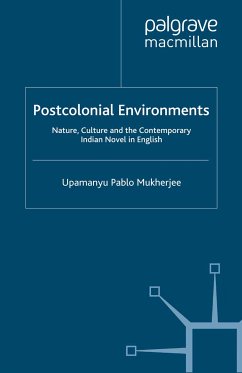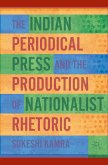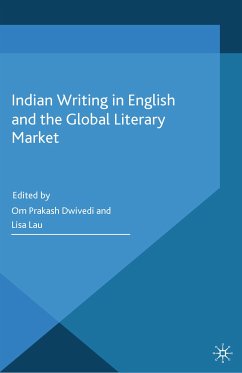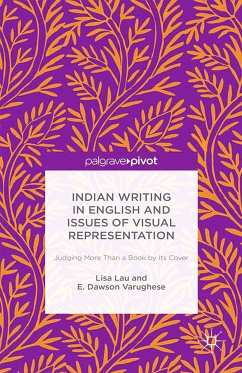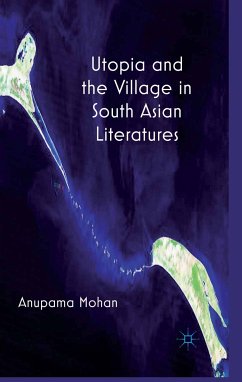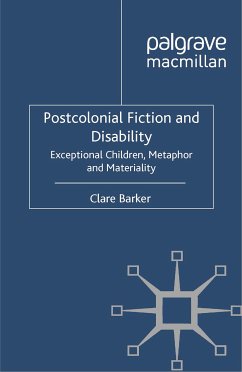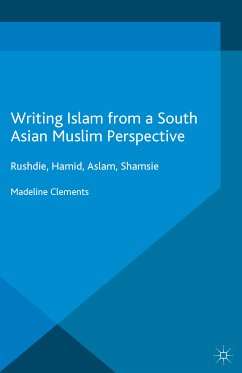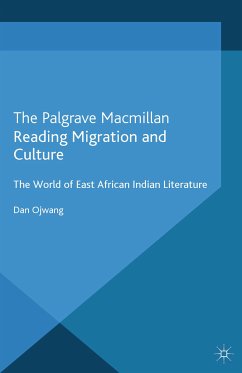Postcolonial Environments examines the relationship between contemporary environmental crises and culture by offering a series of provocative readings of key Indian novels in English, making an original and important contribution to the emerging theories of 'green postcolonialism'.
Dieser Download kann aus rechtlichen Gründen nur mit Rechnungsadresse in A, B, BG, CY, CZ, D, DK, EW, E, FIN, F, GR, HR, H, IRL, I, LT, L, LR, M, NL, PL, P, R, S, SLO, SK ausgeliefert werden.
'Postcolonial Environments makes a valuable contribution both to the emerging field of postcolonial ecocriticism and to the established field of Indian English literature, the two main fields combined in Mukherjee's timely and informative book.'
- Graham Huggan, Professor of Commonwealth and Postcolonial Literatures, Leeds University, UK
'Pablo Mukherjee's Postcolonial Environments is an innovative and timely book which builds a critical genealogy of the rapidly expanding field of postcolonial ecocriticism and suggests new directions for the future.
As the first book to place South Asian literature in a dialogue with postcolonial ecocriticism, Mukherjee makes a powerful and convincing argument for a historical materialist method which he terms 'eco-materialist aesthetics.' This is a compelling model of how to approach the unity of humans and nature, the mediating function of labor, and how the materiality of the environment enables our cultural activity. Building upon Marx's ideas on how labor connects humans to the environment and how capitalism enables nature's destruction, Mukherjee's work provides a piercing critique of how forms of empire, past and present, reflect a 'state of permanent war on the global environment' His exploration of the uneven spatial and cultural development of postcolonial experience leads to a perceptive ability to focus on the stylistic and formal innovations within texts that speak more accurately to an adaptive model of 'eco-materialism.' This is a groundbreaking and original book, one that is destined to change the way we speak of the material history and representation of postcolonial environments.'
- Elizabeth deLoughrey, Associate Professor of English, University of California, Los Angeles, USA
'Postcolonial ecocriticism (or ecocritical postcolonialism) is a robust, vibrant and important field to which Mukherjee's volume in a valuable contribution.' - John Miller, Green Letters
- Graham Huggan, Professor of Commonwealth and Postcolonial Literatures, Leeds University, UK
'Pablo Mukherjee's Postcolonial Environments is an innovative and timely book which builds a critical genealogy of the rapidly expanding field of postcolonial ecocriticism and suggests new directions for the future.
As the first book to place South Asian literature in a dialogue with postcolonial ecocriticism, Mukherjee makes a powerful and convincing argument for a historical materialist method which he terms 'eco-materialist aesthetics.' This is a compelling model of how to approach the unity of humans and nature, the mediating function of labor, and how the materiality of the environment enables our cultural activity. Building upon Marx's ideas on how labor connects humans to the environment and how capitalism enables nature's destruction, Mukherjee's work provides a piercing critique of how forms of empire, past and present, reflect a 'state of permanent war on the global environment' His exploration of the uneven spatial and cultural development of postcolonial experience leads to a perceptive ability to focus on the stylistic and formal innovations within texts that speak more accurately to an adaptive model of 'eco-materialism.' This is a groundbreaking and original book, one that is destined to change the way we speak of the material history and representation of postcolonial environments.'
- Elizabeth deLoughrey, Associate Professor of English, University of California, Los Angeles, USA
'Postcolonial ecocriticism (or ecocritical postcolonialism) is a robust, vibrant and important field to which Mukherjee's volume in a valuable contribution.' - John Miller, Green Letters

